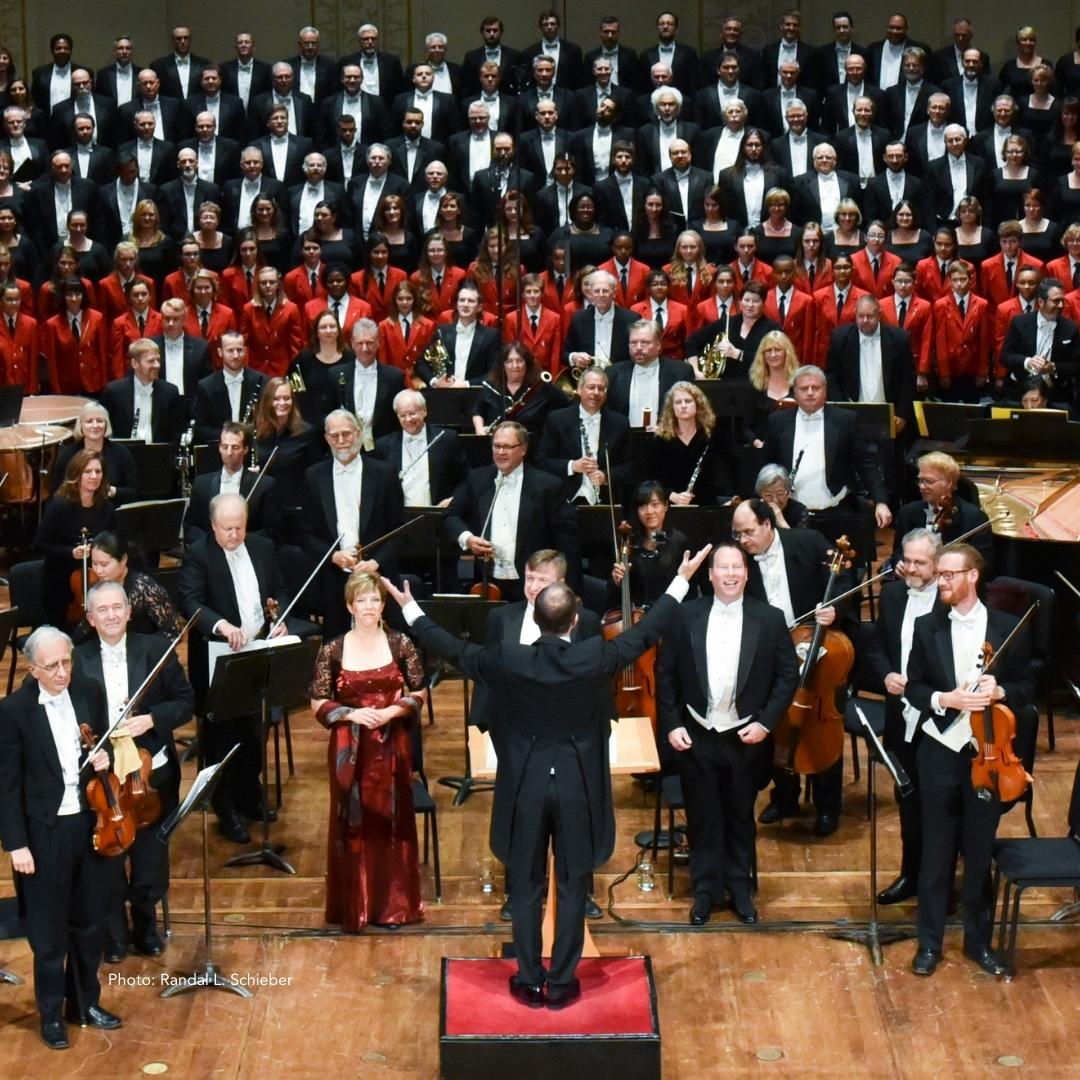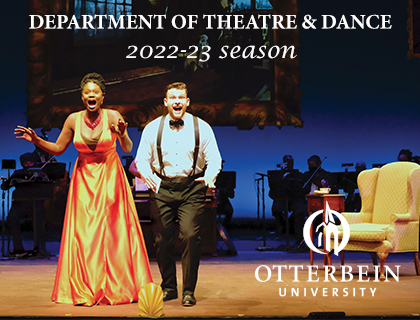
Dear Columbus Symphony Supporter,
Welcome to the Columbus Symphony’s 2022-23 Masterworks series! This will be a season of inspirational musical experiences featuring outstanding works, amazing soloists, and internationally acclaimed guest artists.
A true tour de force opens our season with Carmina Burana, September 30 and October 1. Carl Orff’s iconic work will come alive in full splendor and opulence with a grand orchestra and the magnificent voices of the Columbus Symphony Chorus and the Columbus Children’s Choir.
Following is Brahms & Dvořák, November 4-5, featuring pianist Shai Wosner performing Brahms’ monumental Second Piano Concerto. The program will also include Jesse Montgomery’s Starburst, which draws inspiration from music that surrounded her while growing up in New York’s Lower East Side, and Dvořák’s Symphony No. 6, inspired by Czech folk music.
The Mighty Morton Organ Festival, November 18-19, will showcase the return of iconic organ soloist Cameron Carpenter performing Francis Poulenc’s Concerto for Organ, Strings, and Timpani on the Ohio Theatre’s “Mighty Morton” organ, one of the best instruments of its kind in the country. The program will feature Carl Nielsen’s Masquerade Overture and Leoš Janáček’s rarely performed Glagolitic Mass.
The 2023 new year will be ushered in with the Winter Festival, January 6-7. Bulgarian violinist Bella Hristova will perform Prokofiev’s Violin Concerto No. 1 in a program that also features Rimsky-Korsakov’s Suite from The Snow Maiden and Shostakovich’s mysterious and defiant Symphony No. 6.
This season the Columbus Symphony embarks on its second year of the We are Here for You outreach initiative to advance our commitment to provide meaningful service throughout the central Ohio region and beyond. We continue to uphold the idea that accessibility to music and art can transform lives and play an integral role in developing a deeply connected citizenry that serves the greater good.
On behalf of the entire Columbus Symphony family, thank you for your exceptional support of our orchestra.
Please enjoy tonight’s performance!
Lisa Barton
Board Chair
Rossen Milanov, Music Director
VIOLIN I
Joanna Frankel
Concertmaster
Jack and Joan George Chair
Leonid Polonsky
Associate Concertmaster
Gyusun Han
Assistant Concertmaster
David Edge
Gail Sharp
David Tanner
Robert Firdman
Ross and Pat Bridgman Chair
Maalik Glover
Manami White
Leah Burtnett
VIOLIN II
Alicia Hui
Principal Second
Michael and Arlene Weiss Chair
Tatiana V. Hanna
Assistant Principal Second
Zhe Deng
Zoran Stoyanovich
Mwakudua waNgure
Anna Tsukervanik
Mikhail Baranovsky
Maria Monday
William Manley
Erin Gilliland
VIOLA
Karl Pedersen
Principal
Gay Su Pinnell Chair
Brett Allen
Assistant Principal
Alice Risov
Spencer Ingersoll
Steven Wedell
Kenichiro Matsuda
Ann Schnapp
Ye Jin Goo
Ila Rondeau
CELLO
Luis Biava
Principal
Andy and Sandy Ross Chair
Wendy Morton
Assistant Principal
Gay Su Pinnell Chair
Pei-An Chao
Nikita Annenkov
Mary Davis
Joseph Mueller
Mark Kosmala
BASS
Rudy Albach
Principal
Nationwide Chair
John Pellegrino
Assistant Principal
Russell Gill
Jena Huebner
FLUTE
Joseph Niles Watson
Principal
Lydia Roth
Janet van Graas
OBOE
Hugo Souza
Principal
Gretchen Myers
Robert Royse
CLARINET
David Thomas
Principal
Rhoma Berlin Chair
Mark Kleine
Anthony Lojo
BASSOON
Betsy Sturdevant
Principal
Sheldon and Rebecca Taft Chair
Douglas Fisher
Cynthia Cioffari
HORN
Brian Mangrum
Principal
Julia Rose
Associate Principal
Adam Koch
Megan Amos
TRUMPET
Mark Grisez
Principal
Linda and Joe Chlapaty Chair
Jeff Korak
Lisa and Chris Barton Chair
Gary Davis
TROMBONE
Andrew Millat
Principal
David Parrilla
Joseph Duchi
TUBA
Jonathan Fowler
TIMPANI
Benjamin Ramirez
Principal
American Electric Power Foundation Chair
PERCUSSION
Cameron Leach
Zubin Hathi
Joshua Luthy
Ryan Kilgore
Benjamin Kipp
Christopher Lizak
KEYBOARD
Caroline Hong
Reinberger Foundation Chair
Michael Chertock
LIBRARIAN
Jean-Etienne Lederer
Principal
FRIDAY, SEPTEMBER 30, 2022 | 7:30PM
SATURDAY, OCTOBER 1, 2022 | 7:30PM
CARMINA BURANA
OHIO THEATRE
Rossen Milanov, conductor
Ashley Fabian, soprano
Arthur W. Marks, tenor
Ethan Vincent, baritone
Columbus Symphony Chorus
Ronald J. Jenkins, chorus director
Columbus Children’s Choir
Jeanne Wohlgamuth, artistic director
••••••••••••••••••••••••••••••
|
ORFF |
Carmina Burana |
|
|
|
Fortuna imperatrix mundi |
|
|
|
I. |
Primo vere |
|
|
II. |
In taberna |
|
|
III. |
Cour d’amours |
THIS CONCERT IS DEDICATED IN MEMORY OF DAVID NIWA.
ADDITIONAL SUPPORT PROVIDED BY





MASTERWORKS HOTEL SPONSOR

MEDIA PARTNER

Carmina Burana (1935-36)
by Carl Orff (Munich, 1895 – Munich, 1982)
Carl Orff’s objective—to create complex music from the simplest possible elements—informs both his compositions and his pathbreaking work in music education. The Orff-Schulwerk, an innovative educational system integrating music and movement, is based on some of the same fundamental principles as Carmina Burana, the large-scale choral work that turned the German composer into an international celebrity.
Orff hit upon the subject of Carmina Burana almost by accident. As he later recollected:
“Fortuna” smiled upon me when she brought into my hands a second-hand book catalog from Würzburg, where I found a title that drew me in with an almost magical power:
Carmina Burana: Latin and German Songs and Poems from a 13th-Century Manuscript from Benediktbeuren, edited by J.A. Schmeller.
This manuscript had been kept in the Benediktbeuren Monastery until it was brought to the Royal Court Library in Munich, in the wake of the secularization of the Bavarian monasteries. It was given its name Carmina Burana (‟Songs from Benediktbeuren”) by its editor, the estimable archivist Johann Andreas Schmeller, who had first published it in 1847.
I received the volume on Maundy Thursday of 1934, a day that is still memorable to me. Upon turning to the first page I found the well-known image of “Fortune with her wheel,” and under it the lines O Fortuna velut luna statu variabilis... (“O Fortune, like the moon, everchanging...”)
Picture and words seized hold of me. Although for the moment I was acquainted only along general lines with the contents of the collection of poems, a new work, a stage work with singing and dancing choruses, simply following the illustrations and texts, at once came into my mind. On the very same day I sketched out a partial draft of the opening “O Fortuna” chorus. After a sleepless night in which I nearly lost myself in the poems, another chorus was born, “Fortune plango vulnera,” and by Easter morning a third (“Ecce gratum”) had been set down on paper.
It wasn’t so easy to find one’s way around this codex, with its 250 songs and poems. Most of the poems were in late Latin, but a large number of them were in Middle High German, and some were even in a mixture of Latin texts with Old French refrains...I was fully aware that some of the poems in the collections contained neumes...but I had neither the desire nor the ability to decipher this ancient musical notation.* So I interpreted them rather casually. The things that moved me most of all were the sweeping rhythmic drive, the picturesqueness of the poetry, and (not least of all) the unusually concise Latin text.
Orff divided his work in three sections, devoted, respectively, to a celebration of spring, the joys of the tavern, and “The Court of Love.” The invocation of Fortune and her wheel, which had so impressed Orff, serves as a frame, opening and closing the cantata. This chorus sets the tone of the whole work with brief melodic motifs progressing in relentless ostinatos (unchanging rhythmic patterns). The first major section, “Primo vere” (“In the spring”) begins with a unison melody sung by the chorus that could almost come from the Middle Ages. Its tone continues in the ensuing first baritone aria. The next big chorus (“Ecce gratum”) evokes a folk-music style of more recent date with its clear major tonality. A purely instrumental dance movement then follows, with some changing meters in a definitely 20th-century spirit. In the chorus “Floret silva,” the words “meus amicus” (“my friend”) are given special emphasis by a motif borrowed from Bavarian or Austrian folk dances. This turn, a bold ascending leap of a major ninth, takes on an unmistakable erotic connotation here as the subject matter turns from a description of spring flowers to the blossoming of youthful love. The dance becomes more and more boisterous, ending Part I with some ecstatic high C’s (not often required of choral singers) at the thought of embracing, of all people, the Queen of England!
Part II, devoted to the joys of good food and copious drinks, begins with the “Wandering Scholar’s Confession” by an author known only as the Archpoet of Cologne. This is followed by the Lament of the Roasting Swan, introduced by a high-pitched and tortuously chromatic bassoon solo that is intended to portray the wailing of the unfortunate bird. The tenor solo sings this most unusual “swan song” in a truly murderous high register with some decidedly un-medieval modulations. Meanwhile, the orchestral accompaniment gives us what the late Michael Steinberg, dean of program annotators, used to call “musical gooseflesh—or swanflesh.” The baritone then continues with some mock-Gregorian chant in a satirical imitation of a church sermon. An universal paean to drinking, “In taberna quando sumus,” concludes this section.
Part III (“The Courts of Love”) picks up where Part I left off. The soprano soloist, singing for the first time, expresses an undisguised sexual desire that will linger for the rest of the piece until, in a breathtaking coloratura passage for unaccompanied soprano, the act is finally consummated. All that remains is a solemn celebration of love and beauty (“Ave formosissima”) before the return of Fortune and her wheel puts everything, once more, in a sobering perspective: our thoughts and our endeavors, our joys and our sorrows, are all transient and subject to the whims of this fickle goddess.
After completing the cantata, Orff told his publisher: “Everything I have written to date, and which you have, unfortunately, printed, can be destroyed. With Carmina Burana, my collected works begin.” They continued with two companion pieces, Catulli Carmina (1943) and Trionfo di Afrodite (1951), which were eventually united as a theatrical triptych under the title Trionfi. Yet the companion pieces have never achieved the popularity of Carmina Burana. Also, while Orff clearly intended the work to be performed with sets and costumes (there have been many memorable performances stagings), the work is still most frequently heard in concert version. The music is so powerful that it certainly gets the message across even without the theatrical element.
* They were later deciphered by scholars; the original medieval Carmina Burana has now been widely performed and recorded.
Carmina Burana—Cantiones profanae cantoribus et choris cantandae comitantibus instrumentis atque imaginibus magicis
Songs from Beuern – Secular Songs to Be Sung By Singers and Choruses to the Accompaniment of Instruments and Magic Pictures
Fortuna Imperatrix Mundi
Fortune, Empress of the World
1. Chorus
|
O Fortuna, |
O Fortune! |
|
|
|
|
|
|
Sorsimmanis |
Dread Destiny, |
|
|
|
|
|
|
Sorssalutis |
Good fortune |
2. Chorus
|
Fortuneplangovulnera |
I lament the wounds that Fortune deals with tear-filled eyes |
|
|
|
|
|
|
In Fortune solio |
Once on Fortune’s throne |
|
|
|
||
|
Fortune rota volvitur: |
The wheel of Fortune turns, |
I. Primo Vere
Springtime
3. Chorus
|
Veris leta facies |
The joyous face of Spring |
|
|
|
||
|
Flore fusus gremio |
Reclining in Flora’s lap |
|
|
|
|
|
|
Cytharizat cantico |
Trilling her song |
4. Baritone
|
Omnia Sol temperat |
All things are tempered by the Sun |
|
|
|
||
|
Rerum tanta novitas |
Nature’s great renewal |
|
|
|
|
|
|
Ama me fideliter! |
Love me truly! |
5. Chorus
|
Ecce gratum |
Behold the welcome |
|
|
|
|
|
|
Iam liquescit |
Melt away |
|
|
|
|
|
|
Gloriantur
|
They taste delight |
Uf dem Anger
On the Green
6. Orchestra
7. Chorus
|
Floret silva nobilis Ubi est antiquus Floret silve undique, Gruonet der walt allenthalben, |
The noble forest Where is my old The forest all around is in flower. The forest all around is in flower, |
8. Chorus
|
Chramer, gip die varwe mir, Seht mich an, jungen man! Minnet, tugendliche man, Seht mich an, jungen man! Wol dir, Werlt, daz du bist Seht mich an, jungen man! |
Shopkeeper, give me colored paint Look at me, you young men! Love, all you right-thinking men, Look at me, you young men! Hail to thee, o world that are Look at me, you young men! |
9. Reie
Dance
|
Swaz hie gat umbe, |
They who here go dancing round |
|
|
|
|
|
|
Chume, chum, geselle min, |
Come, come, dear heart of mine, |
|
|
|
|
|
|
Suzer roservarwer munt, |
Sweetest rosy-colored mouth, |
|
|
|
|
|
|
Swaz hie gat umbe, |
They who here go dancing round |
10. Chorus
|
Were diu werlt alle min |
If the whole world were mine |
II. In Taberna
In the Tavern
11. Baritone
|
Estuans interius |
Seething inside |
|
|
|
|
|
|
Cum sit enim proprium |
But whereas it befits |
|
|
|
|
|
|
Feror ego veluti |
I drift along |
|
|
|
|
|
|
Mihi cordis gravitas |
The burdens of the heart |
|
|
|
|
|
|
Via lata gradior |
On the broad path I wend my way |
12. Tenor, male chorus
|
Olim lacus colueram, |
Once in lakes I made my home, |
|
|
|
|
|
|
Miser, miser! |
Alas, poor me! |
|
|
|
|
|
|
Girat, regirat garcifer; |
On the spit I turn and turn; |
|
|
|
|
|
|
Miser, miser! |
Alas, poor me! |
|
|
|
|
|
|
Ninc in scutella iaceo, |
Now in a serving dish I lie |
|
|
|
|
|
|
Miser, miser! |
Alas, poor me! |
13. Baritone and male chorus
|
Ego sum abbas Cucaniensis, |
I am the abbot of Cockaigne |
|
|
|
|
|
|
Wafna! Wafna! |
Wafna! Wafna! |
14. Male Chorus
|
In taberna quando sumus, |
When we are in the tavern |
|
|
|
|
|
|
Quidam ludunt, quidam bibunt, |
Some men gamble, some men drink, |
|
|
|
|
|
|
Primo pro nummata vini, |
First, the dice are thrown for wine: |
|
|
|
|
|
|
Octies pro fratribus perversis, |
Eight times to delinquent brothers, |
|
|
|
|
|
|
Bibit hera, bibit herus, |
The mistress drinks, the master drinks, |
|
|
|
|
|
|
Bibit pauper et egrotus, |
The poor man drinks, the sick man drinks, |
|
|
|
|
|
|
Parum sexcente nummate |
Six hundred coins are not enough |
III. Cour d’Amours
The Courts of Love
15. Boys, soprano
|
Amor volat undique; captus est libidine. |
Love flies everywhere and is seized by desire, |
|
|
|
|
|
|
Siqua sine socio, caret omni gaudio; |
If a girl lacks a partner she misses all the fun; |
|
|
|
|
|
|
fit res amarissima. |
it is a bitter fate. |
16. Baritone
|
Dies, nox et omnia |
Day, night, and all the world |
|
|
|
|
|
|
O sodales, ludite, |
O friends, be merry, |
|
|
|
|
|
|
Tua pulchra facies, |
Your lovely face |
17. Soprano
|
Stetit puella rufa tunica; |
There stood a young girl in a red tunic; |
|
|
|
|
|
|
Stetit puella tamquam rosula; |
There stood a girl fair as a rose, |
18. Baritone and Chorus
|
Circa mea pectora |
My breast is filled with sighing |
|
|
|
|
|
|
Manda liet, manda liet, |
Manda liet, manda liet, |
|
|
|
|
|
|
Tui lucent oculi |
Your eyes shine |
|
|
|
|
|
|
Manda liet, manda liet, |
Manda liet, manda liet, |
|
|
|
|
|
|
Vellet deus, vellent dii, |
May God grant, |
|
|
|
|
|
|
Manda liet, manda liet, |
Manda liet, manda liet, |
19. Six Solo Men
|
Si puer cum puellula |
If a boy and a girl |
20. Double Chorus
|
Veni, veni, venias, ne me mori facias, |
Come, come pray come, do not let me die, |
|
|
|
|
|
|
Pulchra tibi facies, oculorum acies, |
Lovely is your face, the glance of your eyes, |
|
|
|
|
|
|
Rosa rubicundior, lilio candidior, |
Redder than the rose, whiter than the lily, |
21. Soprano
|
In trutina mentis dubia |
In the scales |
22. Baritone, boys and chorus
|
Tempus est iocundum, o virgines, |
Pleasant is the season O maidens, |
|
|
|
|
|
|
Oh - oh - oh, totus floreo! |
Oh, oh, I blossom |
|
|
|
|
|
|
Mea me confortat promissio, |
Complying soothes me, |
|
|
|
|
|
|
Oh – oh – oh, totus floreo, |
Oh, oh, I blossom, |
|
|
|
|
|
|
Tempor brumali vir patiens, |
In Winter time the man is lazy |
|
|
|
|
|
|
Oh – oh - oh, totus floreo, |
Oh, oh, I blossom, |
|
|
|
|
|
|
Mea mecum ludit virginitas, |
My chastity teases me |
|
|
|
|
|
|
Oh – oh - oh, totus floreo, |
Oh, oh, I blossom, |
|
|
|
|
|
|
Veni, domicella, cum gaudio, |
Come my darling, come with joy, |
|
|
|
|
|
|
Oh – oh – oh, totus floreo, |
Oh, oh, I blossom, |
23. Soprano
|
Dulcissime, totam tibi subdo me! |
Sweetest boy, I give my all to you! |
Blanziflor et Helena
Blanziflor and Helena
24. Chorus
|
Ave formosissima, |
Hail to thee most love |
Fortuna Imperatrix Mundi
Fortune Empress of the World
25. Chorus
|
O Fortuna, velut Luna |
O Fortune! Like the moon |
|
|
|
|
|
|
Sors immanis et inanis, |
Dread Destiny and empty fate, |
|
|
|
|
|
|
Sors salutis et virtutis |
Good fortune and strength |











